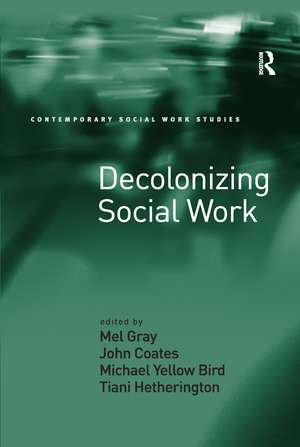Decolonizing Social Work: Contemporary Social Work Studies
Editat de Mel Gray, John Coates, Michael Yellow Bird, Tiani Hetheringtonen Limba Engleză Paperback – 9 sep 2016
| Toate formatele și edițiile | Preț | Express |
|---|---|---|
| Paperback (1) | 492.84 lei 6-8 săpt. | |
| Taylor & Francis – 9 sep 2016 | 492.84 lei 6-8 săpt. | |
| Hardback (1) | 1118.04 lei 6-8 săpt. | |
| Taylor & Francis – 12 iun 2013 | 1118.04 lei 6-8 săpt. |
Preț: 492.84 lei
Nou
Puncte Express: 739
Preț estimativ în valută:
94.30€ • 98.46$ • 78.05£
94.30€ • 98.46$ • 78.05£
Carte tipărită la comandă
Livrare economică 05-19 aprilie
Preluare comenzi: 021 569.72.76
Specificații
ISBN-13: 9781138247390
ISBN-10: 1138247391
Pagini: 380
Dimensiuni: 156 x 234 x 23 mm
Greutate: 0.7 kg
Ediția:1
Editura: Taylor & Francis
Colecția Routledge
Seria Contemporary Social Work Studies
Locul publicării:Oxford, United Kingdom
ISBN-10: 1138247391
Pagini: 380
Dimensiuni: 156 x 234 x 23 mm
Greutate: 0.7 kg
Ediția:1
Editura: Taylor & Francis
Colecția Routledge
Seria Contemporary Social Work Studies
Locul publicării:Oxford, United Kingdom
Cuprins
Contents: Preface, Michael Yellow Bird; Part I Theory: Thinking About Indigenous Social Work: Introduction: scoping the terrain of decolonization, Mel Gray, John Coates, Michael Yellow Bird and Tiani Hetherington; Indigenization, indigenous social work, and decolonization: mapping the theoretical terrain, Mel Gray and Tiani Hetherington; Decolonizing social work: an Indian viewpoint, Vidya Rao; Ecospiritual approaches: a path to decolonizing social work, John Coates; Why decolonized social work is more than cross-culturalism, Ann Joselynn Baltra-Ulloa. Part II Practice: From the Bottom Up: Community-based social work in Cuba, Lourdes de Urrutia Barroso and David Strug; Social work practice with Mexican Americans, Flavio Francisco Marsiglia; From trauma to triumph: perspectives for native Hawaiian and Maori peoples, Noreen Mokuau and Peter J. Mataira; Decolonized social work practice in Jordan, Sahar Al-Makhamreh and Mary Pat Sullivan. Part III Education: Facilitating Local Relevance: Decolonizing social work education in Africa: an historical perspective, Linda Kreitzer; Indigenizing the curriculum: the decolonization of social work education in Hawai’i, Paula T. Tanemura Morelli, Peter J. Mataira and C. Malina Kaulukukui; Challenging international social work placements: critical questions, critical knowledge, Samantha Wehbi; Building bridges with indigenous communities through social work education, Nicole G. Ives and Michael Thaweiakenrat Loft. Part IV Research: Decolonizing Methodologies: Kaupapa Maori social work research, Anaru Eketone and Shayne Walker; Indigenizing research for culturally relevant social work practice, Jon K. Matsuoka, Paula T. Tanemura Morelli and Hamilton McCubbin; Neurodecolonization: applying mindfulness research to decolonizing social work, Michael Yellow Bird; Using indigenist research to shape our future, Shawn Wilson; Conclusion: continuing the decolonization agenda, Mel Gray, John Coates, Michael Yellow Bird and Tiani Hetherington
Recenzii
Prize: Winner of a Choice Outstanding Academic Title Award for 2014 '... most readers will find this book meaningful and provocative. Summing Up: Highly recommended. All academic levels/libraries as well as practitioners.' Choice 'Decolonizing Social Work challenges the profession to take a new path that is creative, critical, and revolutionary. The book examines the profession’s complicity in colonization, both past and present, and explores how social workers around the world are adapting social work to make it locally relevant. The authors help readers understand what decolonizing social work involves, including offering insight into contemporary debates and dynamic dialogues.’ Hilary N. Weaver, State University of New York at Buffalo, USA ’This book fills a significant gap in the literature on social work practice and will be welcomed by indigenous and community based practitioners, as well as social work teachers, supervisors and mentors. The book affirms the need to decolonise monocultural and western frameworks of social work and recognise and apply indigenous values and models when working with indigenous clients and communities.’ Linda Tuhiwai Smith, University of Waikato, Aotearoa New Zealand 'The editors are to be congratulated for providing such an attentive and acutely relevant book to inform social work practice, in regards to countering the effects of ongoing colonization of Indigenous Peoples around the world. Indeed, one of the most dynamic aspects of this book is that it is written from a strong international base by highly knowledgeable contributors, both Indigenous and non-Indigenous, who bring a diversity of perspectives about social work practice, and the continuous struggle to recognize and counter complicit colonization to the detriment of local cultures and communities. ... the book not only fills a significant gap in the literature on social work practice but also reaches out to every profession that is at risk of Whiteness beha
Descriere
In this volume, Indigenous and non-Indigenous social work scholars examine local cultures, beliefs, values, and practices as central to decolonization. Supported by a growing interest in spirituality and ecological awareness in international social work, they interrogate trends, issues, and debates in Indigenous social work theory, practice methods, and education models including a section on Indigenous research approaches.









